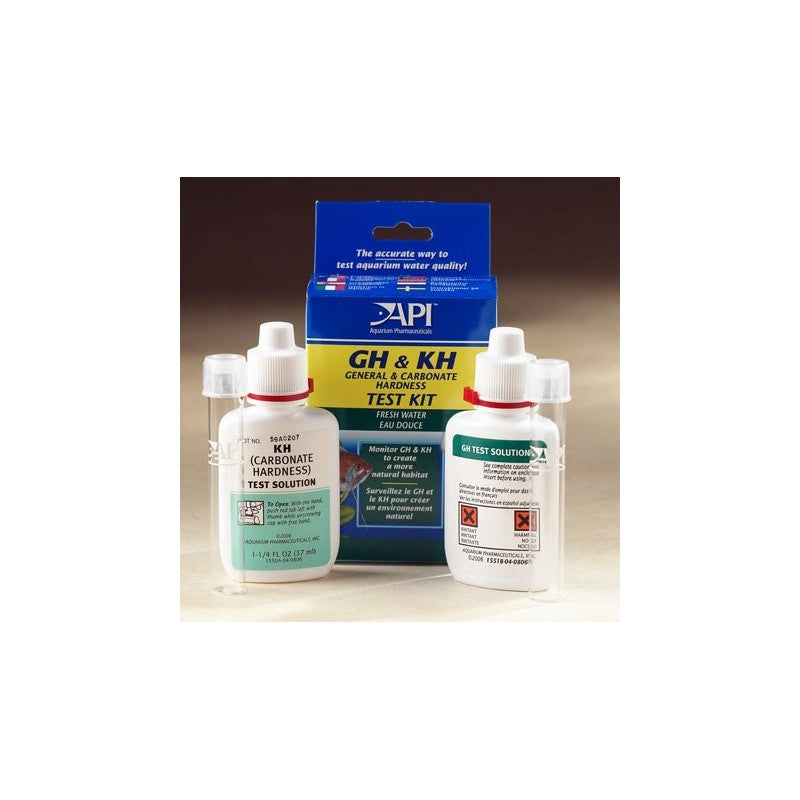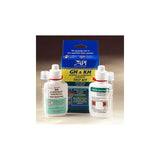API GH/KH Test Kit Fresh water
SeaSide Supplies
Directions for Testing Carbonate Hardness (KH):Read thoroughly before testing. Do not allow Test Solutions to get into aquarium.
Remove childproof safety cap using one hand to push red tab while unscrewing cap with free hand.
Rinse a clean test tube with water to be tested.
Fill the test tube with 5 ml of aquarium water (to the line on the test tube).
Add Carbonate Hardness Test Solution, one drop at a time. Hold dropper bottle upside down in a completely vertical position to ensure uniform drops. After first drop is added, solution will turn blue (If the water sample contains only 1°dKH, the solution will turn from clear to its yellow endpoint after the first drop is added).
Cap the test tube and invert several times after each drop. Count the number of drops being added. Do not hold finger over open end of the tube, as this may affect the test results.
The test is completed when the water in the test tube, after having been shaken, turns from blue to yellow. If you have difficulty discerning the color after the first drop of test solution is added, remove the cap from the test tube and while holding it over a white background, look down through the tube.
The Carbonate Hardness value is determined by the number of drops of the reagent that must be added to turn the water in the test tube bright yellow. Each drop is equal to 1 °dKH or 17.9 ppm KH.
Directions for Testing General Hardness (GH):Read thoroughly before testing. Do not allow Test Solutions to get into aquarium.
Remove childproof safety cap using one hand to push red tab left while unscrewing cap with free hand.
Rinse a clean test tube with water to be tested.
Fill the test tube with 5 ml of aquarium water (to the line on the test tube).
Add General Hardness Test Solution, one drop at a time. Hold dropper bottle upside down in a completely vertical position to ensure uniform drops. After first drop is added, solution will turn orange (If the water sample contains only 1°dGH, the solution will turn from clear to its green endpoint after the first drop is added).
Cap the test tube and invert several times after each drop. Keep count of the drops being added. Do not hold finger over open end of the tube, as this may affect the test results.
The test is completed when the water in the test tube, after having been shaken, turns from orange to green. If you have difficulty discerning the color after the first drop of test solution is added, remove the cap from the test tube and while holding it over a white background, look down through the tube.
The number of drops of the reagent that must be added to turn the water in the test tube green determines the General Hardness value. Each drop is equal to 1 °dGH or 17.9 ppm GH.
General lnformation
What is Carbonate Hardness (KH)?
Carbonate hardness (also known as alkalinity) is the measure of carbonate (CO32-) and bicarbonate (HCO3-) ion concentrations dissolved in water. These minerals are present in municipal, well, and bottled spring water. The level of carbonate hardness in tap and bottled water depends on the source of the water and the treatment processes it has undergone. Carbonate hardness helps stabilize pH in the aquarium. An aquarium with a low KH level (50 ppm or less) will tend to be acidic. Aquariums with very low KH are subject to rapid pH shifts, if not monitored carefully. Water with a high KH level (= 200 ppm) usually has a high pH. The Aquarium Pharmaceuticals KH (Carbonate Hardness) Test measures KH in German degrees (°dKH). To convert °dKH to parts per million (ppm), multiply °dKH x 17.9.
What is General Hardness (GH)?
General hardness is the measure of calcium (Ca2+) and magnesium (Mg2+) ion concentrations dissolved in water. These minerals are present in municipal, well, and bottled spring water. The level of general hardness in tap and bottled water depends on the source of the water and the treatment processes it has undergone. Hard water (= 200 ppm) is high in calcium and magnesium, while soft water (50 to 100 ppm) is low in these minerals. The Aquarium Pharmaceuticals GH (General Hardness) Test measures GH in German degrees (°dGH). To convert °dGH to parts per million (ppm), multiply °dGH x 17.9.
QUESTIONS & ANSWERS
Have a Question?
Be the first to ask a question about this.














